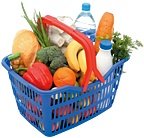What you purchase at the grocery store will affect your eating habits at home and at work. A lot of people have a hard time resisting junk food when it's readily available in the workplace.
In reality, the office should be an ideal place for healthy eating because you can pack breakfast, lunch and snacks and limit yourself to those foods. This takes the guesswork out of five days of your week.
People inherently gravitate toward easy solutions - you're probably no different. Invest in portable foods like precut and prepackaged fruits and vegetables for quick snacks, and strategically place them in the front of the refrigerator (at home or at work) for easy access. You also can make healthy beverage choices by purchasing bottled water, low-fat milk or 100 percent fruit juice instead of being tempted by the morning coffee or midday soda.
Put Your Freezer to Work
Your freezer doesn't have to house only ice cream and frozen TV dinners. Although you may have time and energy when the week begins, most people lose motivation to cook healthy meals by the end of the week, and suddenly, you find yourself pulling into the local fast-food joint. To avoid this trend, consider cooking a full week's meals on the weekend and freezing single portions for those hectic weeknights. You also can buy ready-made meals like reduced-sodium canned soups and frozen vegetable mixes. And it only takes a few minutes to cook skinless chicken breasts, brown rice and vegetables. If you need a last-minute dinner idea, grocery stores offer healthy alternatives to fast food, such as prepared salads and rotisserie chicken. Finally, don't be ashamed to utilize your microwave or slow cooker - whatever keeps you home eating a healthy meal.
 Tips for Quick, Healthy Meals at Home
Tips for Quick, Healthy Meals at Home
- Cook meals for the entire week in advance and freeze single portions.
- Stock up on quick and easy meals like reduced-sodium soups and frozen vegetable mixes.
- Bring precut and prepackaged fruits and vegetables to work.
- Buy bottled water, low-fat milk or 100 percent fruit juice, rather than coffee and soda.
- Keep a running grocery list to prevent impulse buying.
- Don't grocery shop while hungry; stick to your list.
- Invest in a cookbook with low-fat, low-carb recipe ideas.

